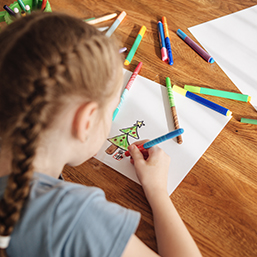
There are moments in parenting that stand out in the midst of all the day-to-day goings-on. One such moment took place on a hot day in July. It was the day of the epic meltdown of my then three-and-a-half-year-old, which certainly changed the trajectory of several young people's lives on that train from Kingston to Niagara Falls, Ontario. Yes, there were several young people on that ride who would have firmly decided against parenthood after the very loud and tearful meltdown that seemed unending to everyone in its vicinity, but especially to his frazzled mother.
Thankfully, this was a turning point in my parenting journey, as I realized my need for new strategies to help myself and my little boy to be both calmer and happier. I had heard that mindfulness and self-regulation were helpful and decided to give them a try.
Often, when we think of mindfulness, we imagine sitting still and meditating with a magically quiet or empty mind. That can be intimidating. Consider instead that mindfulness can be anything that helps you to become more aware and more present. I encourage you to test some of these ideas and find which ones work best for your family.
Be a learning parent. Look around at the parents in your life, whether they are friends, family members, or acquaintances. Are there some who you admire? Do their children appear calm and happy? If so, chances are they are doing some things that work. Maybe they limit screen time. Maybe they follow a regular routine for bedtime. Maybe they pay close attention to nutrition and avoid junk food and sugar-heavy foods.
Practice self-care. When we are tired and stressed, we tend to have children who are also tired and stressed. Most of us can take five minutes to pause, to breathe, to refocus, and be present. You will benefit, your kids will benefit, and it will help your relationship with your kids.
Explore mindfulness with your children. There are many opportunities to learn to be more mindful with your children. Find what works for your family by trying things out. You might take a yoga or Tai Chi class together, or find a free class on the internet. There are many simple breathing techniques that work wonders for children. Check the public library for stories that emphasize self-regulation, breathing, and emotional skills.
Consult the experts. There are great resources available from various experts. I will only mention one here because I have found it to be an essential book for every parent and for every person who would like to experience more peace, calm, and life satisfaction. The book is called Self-Reg by Dr. Stuart Shanker and his Self-Reg website contains a treasure trove of helpful resources. (self-reg.ca/resource-library).
Take them outside. The emotional and health benefits of outside time are well-documented. Children (and adults) who spend time outdoors find that they are more able to concentrate and focus, experience better sleep, and are happier. Consider planning a special outing for each season. Find spring crocuses, gather summer Saskatoon berries, collect fall leaves, and lie in the snow studying the constellations in the night sky!
Create together. Endless opportunities exist to create by cooking, baking, painting, drawing, making music, working with playdough or clay, crafting, knitting, and much more. Remember to keep it fun and at a level that is interesting and where your child can be successful.
Learn to talk about feelings and needs. Begin by learning about your own feelings and needs, then practice communicating about them. Bring that understanding to your children, teaching them words to describe feelings, so they can begin to understand, accept, and deal with feelings in healthy and constructive ways.
Self-Regulate! The most effective way to teach your child to self-regulate, or to be “quiet on the inside,” is for the adults who they are with to be self-regulated. This means that we give attention to our physical needs for nutritious food, sufficient sleep, and balanced exercise. We notice our feelings and develop strong emotional skills. We are mindful of our thoughts and how they impact our lives.
We keep learning and growing ourselves, because that’s the best way to support our children and enhance our own happiness and relationships.
Teresa Monaghan is a local writer and the author of When I Am Quiet, a children’s book to support yours and your children’s mindfulness journey.
See our related articles:
Calgary’s Child Magazine © 2024 Calgary’s Child